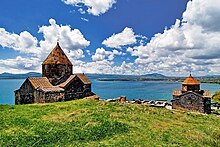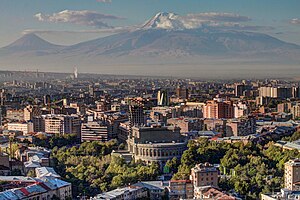Wikimedia CEE Meeting 2016/City
Armenia

Armenia is a sovereign state in the South Caucasus region of Eurasia. Armenia has been around for at least 3,000 years. Armenians have historically inhabited the "Armenian Highlands", a vast section of mountains and valleys across eastern Anatolia and the Southern Caucasus. It is here that the biblical mountains of Ararat (and today's eponymous cognac brand) can be found. Armenia became the world's first Christian country in 301 AD. Given its proud claim to being the world's first officially Christian country, there are countless monasteries and churches, which are set in some places of incredible natural beauty. 97% of Armenia's population belongs to the Armenian Apostolic Church, an Oriental Orthodox Church.
Armenian is the only official language in Armenia, which forms its own language group in the Indo-European language family. However, almost all Armenians can speak some Russian because Armenia was part of the Soviet Union, and Russian continues to be a compulsory second language in schools. English is becoming more widely spoken, particularly in Yerevan; however, outside the capital, very few people speak any English.
See more on Wikivoyage.
Yerevan

Yerevan (Armenian: Երևան) is the capital of the Republic of Armenia, one of the three hubs of the South Caucasus and is home to over a million people - the largest Armenian community in the world. In Soviet years Yerevan underwent massive reconstruction, following Alexander Tamanyan's (the architect) new plans to make a perfect city - a Neo-Classical wide-avenues-based town. In Soviet days Yerevan had already become known as the Pink City as much due to the colour of the tufa stone used for building as for the flamboyant spirit of her young population.
Most of tourist Yerevan is concentrated in the city centre, which very compact and easily walkable, with endless dining and entertainment options.
Many visitors will be surprised to know that Armenia is not just an outcrop of Christianity in the Caucasus, but it is the first country in the world to adopt Christianity as a state religion. The king declared Christianity the state religion in 301 AD. Christianity has been uninterruptedly practiced in Armenia ever since in its own traditions.
With a cold semi-arid climate, Yerevan experiences long hot summers, and cold snowy winters, both with little.
Yerevan is generally safer than many western-European cities, and crime and street violence is almost non-existent.
See more on Wikivoyage.
Dilijan

Dilijan is a town with mild climate and fresh air to the northeast of Yerevan. It is famous for its lovely surroundings, called the "Armenian Switzerland" by the locals, due to the densely forested valleys and mountains with alpine meadows surrounding them. It is an excellent base for hiking.
The first settlements in this area were established around the end of the second millennium and beginning of first millennium BC. Some excavated collections of artifacts from that period are exhibited in the museums of Moscow, Saint Petersburg, Tbilisi, Baku and Yerevan, with the reminder kept in the Dilijan Geological Museum.
The best months to visit Dilijan are May-October, the months with the most pleasant temperatures. July and August, the hottest months, have average daily highs of around 26 C. and average lows around 12 C.
See more on Wikivoyage
UWC Dilijan

The United World College Dilijan is the 14th member of the United World Colleges (UWC) movement, one of fifteen colleges around the world, and the first international boarding school in Armenia. The college matriculated its first 96 IB1 students (11th graders) in September 2014.
The mission of the UWC movement and of the school is to "make education a force to unite people, nations and cultures for peace and a sustainable future".
A portion of the school is on the premises of Dilijan National Park.
